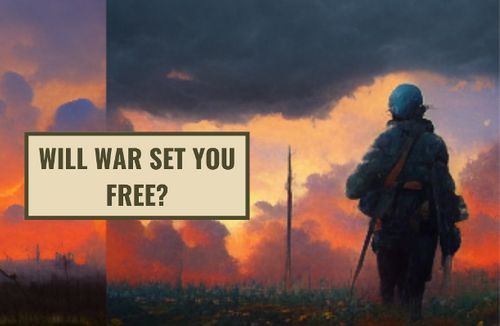War is the Father of Freedom
Oct 15, 2022 · 2 mins read
0
Share

Introduction. Nietzsche has one of the most interesting accounts of freedom in all of philosophy. In this Memo, discover how genuine freedom has become close to impossible in today's world, why our in-fighting instinct aren't helping, and how war can set us free. Read on 👇
Save
Share
Nietzsche is famously anti-reason. He tears into Socrates because Socrates made the Greek civilization reasonable, and hence weak. He puts instinct as a desirable alternative to the limited and slow reason - but today, we can't lean too heavily on instincts either, because...
Save
Share
Because the modern man is a house divided. Nietzsche says a modern person is a walking "physiological self-contradiction." To rely on instincts is "one fatality more" because our instincts "contradict, disturb, and destroy one another." Our energies are running around distracted.
Save
Share
Nietzsche: "The claim to independence, to free development, is advanced most heatedly by precisely those for whom no curb could be too strong." Ideally education would suppress many instincts with "iron pressure" and make one instinct the "master" but this doesn't really happen.
Save
Share
Betrayed by our own in-fighting instincts, and stranded by schools and universities more interested in expanding minds instead of teaching them to focus, what are we to do? To gain freedom, which Nietzsche defines as "the will to self-responsibility," we must turn to war.
Save
Share
Nietzsche: "War is a training in freedom." War teaches us to be "indifferent to hardship, toil, privation, even to life." War promotes mastery over the "instinct for happiness" and over the "contemptible sort of well-being dreamed of by shopkeepers, cows, and other democrats."
Save
Share
War forces us to take stock of "our resources, our virtues, our shield and spear, our spirit" - and it "compels us to be strong." Nietzsche: "First principle: one must need strength, otherwise one will never have it." Therefore war makes us more self-aware than peace.
Save
Share
Once we've developed an indifference to pain, learnt to look down at happiness, and established our in-fighting instincts into a more functional hierarchy - then we can be free. It is war and great challenges - organic or self-imposed - that create pre-conditions for freedom.
Save
Share
Nietzsche: "One would have to seek the highest type of free man where the greatest resistance is constantly being overcome." To overcome resistance we are forced to know our strengths and weaknesses, and then we are ready for the "will to self-responsibility" - for freedom.
Save
Share
Bottom line. Nietzsche turns the common notion of freedom - lack of restraint - on its head. He shows that it is the presence of many crushing restraints that make genuine freedom possible.
If you enjoyed this, check out Nietzsche's investigation of the artist's psychology.
Save
Share
0




